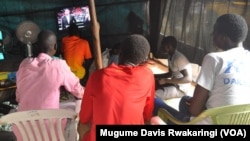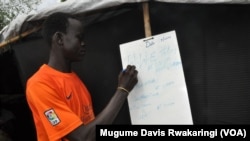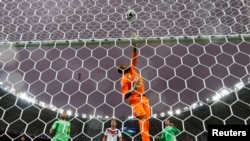In a corner of the U.N. Mission in South Sudan's (UNMISS) Tongping camp in Juba, men sit on plastic chairs, watching soccer on a small television screen in a makeshift cinema.
David Rajor Konyi, who worked as a driver before he sought shelter at the UNMISS compound when South Sudan plunged into conflict, set up the cinema "...to help encourage some youth. Young men need to watch films and other sports, like wresting and soccer,” he said.
Rajor used the few thousand pounds that he was able to save before fighting broke out in Juba in mid-December, to buy a TV set, chairs, mats, lights, a sound system, and a small generator. He put the equipment in a four meter by eight meter tent and opened for business.
At first, Rajor showed a lot of wrestling, which has a large following in South Sudan. The cinema got quite full for the wrestling shows, and after paying his expenses, Rajor was making a daily profit of 30 South Sudanese pounds – enough to buy food and clothing for the seven family members who are with him in the camp.
But when the World Cup kicked off, Rajor says his fortunes changed dramatically. His cinema was overwhelmed by clients. Sometimes, the 100 seats in the viewing hall were not enough to accommodate everyone who showed up for a match.
'I forget about everything'
Michael Koang Khan, 38, says coming to the cinema to watch football helps him to forget the awful situation that he and more than a million other displaced South Sudanese are in -- living in cramped, squalid camps as peace talks grind on without producing much in the way of results.
When you go to watch a game, there is no difference between you and other people. You watch together and there is not anyone who can say this one is from this tribe or that tribe.South Sudan World Cup Fan Ruei Ter Koul
“When I am watching, I forget about everything," said Khan, who had just returned to Juba from Kenya, where he earned a university degree in business management, when the fighting broke out.
"It also gives me time to rest when I watch. It is also helping me to remember what I was doing before, when I was young. I was also a footballer," he said.
Ruei Ter Koul, 27, said he feels a sense of unity when he sits with other football fans in the tent and watches World Cup action unfolding on the small television screen.
“When you go to watch a game, there is no difference between you and other people. You can watch it together and there is not anyone who can say this one is from this tribe or that tribe,” he said.
The World Cup has also been a learning experience for Koul.
"There is a country called Chile -- I had never heard about it until I saw it in the World Cup," he said.
Even though the five African nations that qualified for the World Cup -- Algeria, Cameroon, Ghana, Ivory Coast and Nigeria -- are out of the running for the gold-plated trophy, Rajor says he still expects a full house at his cinema to watch the final matches.
But like his clients, his most fervent hope is that he will be able to shut down his cinema hall in Tongping camp because peace will come to South Sudan and it will be safe for him and everyone else to go back home.
More than 1.5 million South Sudanese have fled their homes since the fighting began. Around 100,000 of them are living in U.N. compounds that have been turned into camps for the displaced, and in spite of the government assuring South Sudanese that it is safe for them to leave the camps and return home, they are staying put in the U.N. Protection of Civilians sites.






